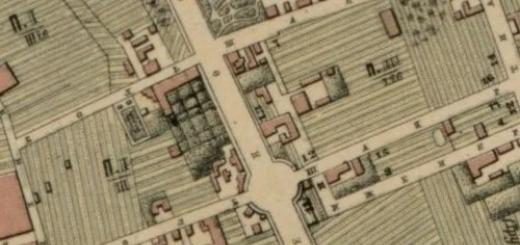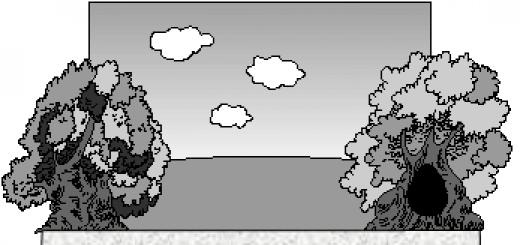1. If we consider that science is accumulation and at least minimal systematization of knowledge, then science existed in all, even the earliest cultures (cultures of the Bronze Age - ancient india, Ancient China, Babylon, Egypt) already in the 3rd-1st millennium BC. disadvantage scientific knowledge at this stage, there was sacralization and lack of evidence (the so-called "recipe knowledge": do it!).
2. If we assume that main feature science - striving for evidence, argumentation as a means of establishing the truth, then science was born in Ancient Greece in the VI-V centuries BC (The stage of "Aristotelian" science) The emergence of the requirement of evidence is considered an indirect result of the replacement of a rigidly hierarchical organization of society with a democratic one.
3. If we consider that science - a system of reliable knowledge about reality, a set of specific research methods and a special social organization for the production of knowledge, then the formation of science should be attributed to the turn of the 16th-17th centuries (the stage of "Galilean science"). During this period in Western Europe there is:
─ development of methodology and special methods scientific knowledge:
─ the formation of science as practically oriented, which leads to broad public support for science;
─ the organizational formation of science begins: scientific communities, public research centers, and scientific periodicals are emerging.
Science as a kind of knowledge is distinguished by certain signs. The formulation of these signs depends primarily on which of the sciences is considered as a model. For a long time, mathematics acted as a "model" science. Therefore, the main features of science were considered axiomatism And deductivity, which are the main characteristics mathematical knowledge. In modern times, the rank of exemplary science was elevated experimental and mathematical natural science, and to the logico-mathematical criteria of scientific character were added empirical.
The neopositivists put demarcation problem : the question of clear criteria for distinguishing between science and non-science, pseudoscience. This problem has become one of the central ones in the philosophy of science of the 20th century. Its essence lies in determining the characteristics that science and the knowledge achieved in it possess and that other types of knowledge do not possess.
To such featured science include: consistency, evidence, logical consistency, empirical confirmation, simplicity, reproducibility, etc.
Describing in general approaches to the development of scientific knowledge, the following positions can be distinguished: cumulative And anticumulativeism, externalism And internalism.
Cumulative approach(from Latin cumulatio - increase, accumulation) to the development of knowledge absolutizes continuity. The development of science from this point of view is a process of gradual accumulation of facts, theories or truths. Everything new is gradually added to the already known.
For anti-cumulative characteristic the idea of incommensurability of scientific theories. Being the abstract opposite of cumulativeness, the principle of incommensurability of scientific theories idealizes the moments of abrupt transition to new concepts observed in the history of science. The idea of incommensurability was shared, for example; K. Popper, T. Kuhn, P. Feyerabend.
From point of view K. Popper(1902 -1994):
─ scientific knowledge does not begin with the collection of facts, it begins with the advancement of conjectures, assumptions, hypotheses, which are compared with facts and, ultimately, discarded;
─ falsified hypotheses are replaced by new ones; newly put forward hypotheses and theories do not follow from the old ones, they are completely A New Look, unrelated to the previous one;
─ the lack of continuity between already refuted theories and new ones still awaiting refutation turns the history of science into a competition of theories, into a constant struggle for survival.
T. Kuhn(1922-1995) put forward the concept paradigms. Under paradigm g In the main way, he understood the scientific theory, which in a certain historical period performs the function of a model of scientific research.
Paradigm– 1. a set of basic explanatory principles and standard methods of analysis; 2. something with which everyone agrees, and from which they proceed, taking it simply as a given.
So, the physics of Aristotle, the geocentric system of Ptolemy, the physics of Newton acted as a paradigm in their time. For example, A. Einstein's theory of relativity belongs to modern paradigms.
Exploring the history of science, T. Kuhn highlights two stages of development of science : normal and revolutionary. Stage of normal science represents the activity of scientists within the framework of the accepted paradigm. Science is in this state most of the time of its development. However, the accumulation of anomaly facts that cannot be explained from the point of view of the old paradigm leads to to a revolution in science which is expressed in a paradigm shift. New paradigm defines a new type scientific tasks and new solutions. The change of paradigms is not considered by T. Kuhn as a deepening or expansion of knowledge, as an approximation to the truth. Each new paradigm offers a different perspective, incommensurable with the previous one.
On the issue of factors influencing the development of scientific knowledge, already in the 30s of the XX century. There are two alternative approaches: externalism And internalism.
Externalism sees the main driving forces for the development of scientific knowledge in external in relation to scientific theory factors: historical context, socio-economic conditions, type of rationality, style of thinking, mentality of the era, etc.
AND internalism, without denying the role of external circumstances, focuses on the internal factors in the development of scientific knowledge: the internal logic of the development of science, which determines the sequence of problems.
IN structure of scientific knowledge i allocate empirical and theoretical levels. These levels differ from each other in a number of parameters, the main of which are methods of knowledge, as well as the nature of the knowledge gained:
─ to the main methods empirical levels are observation And experiment.
─ theoretical level is characterized by the use analysis, synthesis, idealization, deduction, analogy and other methods of knowledge.
Main types of knowledge:
on the empirical level scientific research - fact And experimental law;
on the theoretical level is, first of all, theory.
At the empirical level, scientific knowledge deals with the individual properties of an object, given in experience. The inductive generalization of the collected data is presented in the form of experimentally established regularities.
The theoretical level of scientific knowledge is distinguished by its focus on discovering the general, necessary, regular characteristics of an object, which are revealed with the help of rational procedures. At the theoretical level, theoretical laws are formulated.
The difference between empirical and theoretical level is not absolute. Scientific knowledge necessarily includes both empirical and theoretical levels of research. At the empirical level, the connection of scientific knowledge with reality and with the practical activity of a person is provided. The theoretical level is the development of a conceptual model of the subject of knowledge.
40. The structure of scientific knowledge. scientific revolutions.
Scientific knowledge and the very process of obtaining it are characterized by consistency and structure. First of all, in the structure of scientific knowledge, there are empirical And theoretical levels. They are distinguished by the depth, completeness, comprehensiveness of the study of the object; goals, methods of research and ways of expressing knowledge; the degree of significance in them of sensual and rational moments.
^1. Empirical level
In the most generalized form, empirical research is knowledge about a phenomenon, and theoretical research is about its essence. Empirical Research - this is a level of scientific knowledge, the content of which is mainly obtained from experience, from the direct interaction of a person with objective reality. At the empirical level, objects are observed, facts are recorded, experiments are carried out, empirical relationships and regular connections between particular phenomena are established.
^2. Theoretical level
The theoretical level of scientific knowledge is a higher level of the study of reality. Here the object appears from the side of those of its connections and relations that are inaccessible to direct, sensory study. At this level, systems of knowledge and theories are created, in which general and necessary connections are revealed, laws are formulated in their systemic unity and integrity.
THE FOUNDER OF HISTORICAL SCIENCE
Herodotus is considered to be the first real historian of antiquity, and therefore of all times. He was originally from Halicarnassus - one of the Greek cities on the coast of Asia Minor, now this place is located in Turkey. Herodotus was born around 484 BC. e., lived until 425 BC. e. Speaking in his youth on the side of the opponents of the Helicarnassian tyrant Ligdamida, Herodotus had to flee from hometown. After that, he spent about ten years traveling around different countries, visited the island of Samos, Phoenicia, Libya, Egypt, Judea, Syria, Babylon, Assyria, Ecbatana. He visited many Greek states and Macedonia.
For a long time the scientist lived in Athens, this city-state of Hellas became his second home. Here he met and made friends with many of the most educated people of Ancient Greece, such as Pericles, Anaxagoras, Socrates, Aspasia. In Athens, obviously under the influence of new friends, Herodotus wrote his outstanding work "History".
Translated from the Greek "historian" - a story about the past, about what has been learned. Herodotus devoted his work to describing the Greco-Persian wars of 493-449. BC e.
The mighty Persian Empire, created by the kings Cyrus II, Cambyses II, Darius I, established its dominion in Asia Minor, conquered Babylon and Egypt, the Greek islands of Chios and Samos. Trade, the main condition for the prosperity of the Greek cities in Asia Minor, Hellas itself as a state - everything turned out to be under the cruel, oppressive control of the rulers of the Persian Empire. The uprising raised in the Ionian - Asia Minor cities of Hellas against Persian rule and supported by Athens was suppressed. After that, the Persian state began to lay claim to the very heart of Ancient Greece - policies on the Balkan Peninsula. In 490 BC. e. The Persians crossed the Aegean Sea, captured the city of Eretria and landed in Attica. From that moment on, with some interruptions, stubborn and bloody wars continued until 449 BC. e. The Greeks won. Rallying under the threat of enslavement, the Greek city-states defended their freedom and independence.
The main theme of the work of Herodotus is the campaign in Greece of the Persian king Xerxes in 480-479. BC e., during which took place: the tragic battle at Thermopylae, where 300 Spartans and King Leonidas held back the entire Persian army for four days; the naval battle in the Salamis Strait, where the victory was brought to the Greek fleet by the brave commander Themistocles; and the decisive battle at Plataea, in which the Greeks were victorious. But how different is the work of Herodotus from the annalistic praises by the Assyrians and Egyptians of the military exploits of their rulers. Yes, of course, the Greek author pays tribute to the stamina and courage of King Leonidas, the military talent and foresight of Themistocles, extols the courage of the Greek warriors. But, in addition, he tries to explain the reasons for the Persian invasion of the territory of the Greek states and to understand the origins of the defeats and victories of the Persians and Greeks. Herodotus sees the basis for the superiority of the Greek resistance over the more numerous Persian army in state structure Greek world. According to Herodotus, the Greeks are "free and subject only to the law" - this is their main strength.
Along the way, reflecting the course historical events, Herodotus gives a holistic and multifaceted picture of the entire Mediterranean world, a description of the life of the peoples of Egypt, Phoenicia, Syria, Macedonia. In this, the observant and inquisitive author turned out to be extremely useful in his own long wanderings.
Later, the scientists of Alexandria divided the work of Herodotus into nine books, each of which was named after one of the Greek muses, patrons of the arts, including Clio, the muse of history. The work of Herodotus was highly valued by ancient authors, served as an example for the historians of Ancient Greece to follow, ancient rome, other countries of the Hellenic world, was an example for posterity.
Prominent Roman statesman and the excellent orator Cicero called Herodotus "the father of history." And this is true, because in his work for the first time the history of human society is shown as a process unfolding in time and space, changing the fate of peoples. For the first time, he made attempts to analyze the causes leading to a particular historical outcome.
Everything that surrounds us can be mentally divided into two large spheres: everything not created by man (natural) and everything created by him (artificial). As a rule, we call the first sphere nature, and the second - culture.
As you know, culture, in turn, is also divided into two large groups: material and spiritual. Spiritual culture exists in various types or forms, of which the main ones are science, religion, art and philosophy. These forms of spiritual culture are similar in that, with the help of them, a person tries to answer the countless questions that he, being a rational being ( homo sapiens), from the time of its appearance on earth, does not get tired of asking itself; and the difference between them is that they examine different objects and use different methods.
So, the subject of science is, as a rule, the natural (natural, physical) world, mastering which, it strives to high degree the accuracy of his knowledge, considers it necessary to prove everything, as well as experiment, penetrating deeper and deeper into the secrets of nature, and derive practical benefits from this, increasing the technical power of man.
The subject of religion, on the contrary, is the supernatural (otherworldly, divine) world, which, from its point of view, really exists and determines all earthly events. It is clear that in this world, unlike the natural world, nothing lends itself to experiment, which means that it is impossible to either prove or disprove its existence. What then is possible? Only unproven faith: arbitrarily, freely, by virtue of our only desire to believe in the reality of God, the immortal soul and eternal life. So, religion, unlike science, is directed not to the natural, but to the supernatural world, and is based not on proof, but on faith.
The subject of art is the inner, emotional world of a person. Unlike science, art does not seek to prove anything, and unlike religion, it does not call for unconditional belief in anything. It is based on expression and transmission through artistic images human feelings, moods, experiences.
Philosophy, unlike science, religion and art, is not limited to any one sphere of reality and tries to cover both the natural and the supernatural and the inner, emotional world of a person. At the same time, as a means of mastering these worlds, it recognizes both evidence-based knowledge, and unproven faith, and aesthetic feeling, differing, as we see, from other forms of spiritual culture on a wider scale.
Let us return to the science to which these lectures are devoted. As already mentioned, science is one of the forms of spiritual culture, which is aimed at studying the natural world and is based on evidence. Such a definition will undoubtedly cause some confusion: if science is a form of spiritual culture aimed at mastering the natural, or natural, world, then it turns out that the humanities cannot be sciences, because nature is not the object of their study. Let's dwell on this issue in more detail.
Everyone knows that the sciences are divided into natural (or natural science) and humanitarian (also often called social and humanitarian). The subject of the natural sciences is nature, studied by astronomy, physics, chemistry, biology and other disciplines; and the subject of the humanities is man and society, studied by psychology, sociology, cultural studies, history, etc.
Let us pay attention to the fact that the natural sciences, in contrast to the humanities, are often called exact. And indeed, humanities lacks the degree of precision and rigor that is characteristic of the natural. Even on an intuitive level, science means, first of all, natural science. When the word “science” sounds, first of all, thoughts about physics, chemistry and biology come to mind, and not about sociology, cultural studies and history. In the same way, when the word "scientist" is heard, the image of a physicist, chemist or biologist first rises before the mind's eye, and not a sociologist, cultural scientist or historian.
In addition, the achievements of the natural sciences are far superior to those of the humanities. Throughout its history, natural science and technology based on it have achieved truly fantastic results: from primitive tools to space flights and creation of artificial intelligence. The successes of the humanities, to put it mildly, are much more modest. Questions related to the comprehension of man and society, by and large, remain unanswered to this day. We know a thousand times more about nature than we do about ourselves. If man knew as much about himself as he knows about nature, people would probably already achieve universal happiness and prosperity. However, things are quite different. A long time ago, a person fully realized that one cannot kill, steal, lie, etc., that one must live according to the law of mutual assistance, and not mutual eating. Nevertheless, the entire history of mankind, starting with the Egyptian pharaohs and ending current presidents, is a history of disasters and crimes, which suggests that for some reason a person cannot live as he sees fit and right, cannot make himself and society the way they should be according to his ideas. All this is evidence in favor of the fact that man has made almost no progress in the knowledge of himself, society and history. That is why the concepts of "science", "scientific knowledge", "scientific achievements", etc., as a rule, mean everything related to natural science. Therefore, speaking further about science and scientific knowledge, we will have in mind the natural sciences.
The differences between the natural sciences and the humanities outlined above are, of course, due to the fact that both are aimed at different, incomparable objects and use completely different methods. Man, society, history, culture are immeasurably more difficult objects to study than the inanimate and nature. Natural science makes extensive and universal use of experimental methods and constantly relies on them. In the field of humanitarian research, however, experimentation is the exception rather than the rule. Because of all this, the humanities cannot be built in the image and likeness of the natural sciences, just as one cannot accuse them of insufficient accuracy, rigor, and low, in comparison with natural science, effectiveness. After all, figuratively speaking, this is tantamount to a reproach addressed to a stream that it is not a waterfall ... Nevertheless, natural science is usually considered science in the full sense of the word.
There are several points of view on the time of the emergence of science. According to one of them, it appeared in the Stone Age, about 2 million years ago, as the first experience in the manufacture of tools. Indeed, to create even primitive tools, some knowledge of various natural objects which is practically used, accumulated, improved and passed on from generation to generation.
According to another point of view, science appeared only in the era of the New Age, in the 16th - 17th centuries, when they began to be widely used experimental methods, and natural science spoke in the language of mathematics; when the works of G. Galileo, I. Kepler, I. Newton, H. Huygens and other scientists saw the light. In addition, the emergence of the first public scientific organizations - the Royal Society of London and the Paris Academy of Sciences - also belongs to this era.
The most common point of view on the time of the emergence of science is the one according to which it originated approximately in the 5th century. BC. in Ancient Greece, when thinking began to become more and more critical, i.e. sought to rely more on the principles and laws of logic, and not on mythological traditions and traditions. Most often you can find the statement that the cradle of science is Ancient Greece, and its ancestors are the Greeks. However, we are well aware that long before the Greeks, their eastern neighbors (Egyptians, Babylonians, Assyrians, Persians and others) accumulated a lot of factual knowledge and technical solutions. How could the Egyptians build their famous pyramids if they did not know how to weigh, measure, calculate, calculate, etc., i.e. if you weren't familiar with science? And yet, the Greeks are considered its ancestors, because they were the first to pay attention not only to the world but also on the very process of its cognition, on thinking. It is no coincidence that the science of the forms and laws of correct thinking - the logic of Aristotle - appeared precisely in ancient Greece. The Greeks put things in order in the chaos of the knowledge, decisions, recipes accumulated by their eastern neighbors, gave them a systematic, orderly and coherent manner. In other words, they began to engage in science not only practically, but also, to a greater extent, theoretically. What does it mean?
The Egyptians, for example, were not alien to science, but were engaged in it practically, i.e. measured, weighed, calculated, and the like. when it was necessary to build or build something (dams, canals, pyramids, etc.). The Greeks, unlike them, could measure, weigh and calculate for the sake of measuring, weighing and calculating, i.e. without any practical need. This is what it means to engage in science theoretically. Moreover, the practical and theoretical levels are too far apart. Let's use an analogy to illustrate this idea.
Each of us practically began to use our native language at about 2-3 years of our life, and theoretically we began to master it only with school age, having been doing this for about 10 years, and still, for the most part, they have not mastered it to the end ... We practically know our native language both at 3 years old and at 30 years old, but how different is its use at both ages. At the age of 3, we speak our native language, not having the slightest idea not only about declensions and conjugations, but also about words and letters, and even about the fact that this language is Russian, and that we speak it. At an older age, we still practically use our native language, but not only thanks to an intuitive acquaintance with it, but also, to a greater extent, on the basis of its theoretical mastery, which allows us to use it much more effectively.
Returning to the question of the birthplace of science and the time of its emergence, we note that the transition from its intuitive-practical state to the theoretical one, which was carried out by the ancient Greeks, was a real intellectual revolution and therefore can be considered the starting point of its development. Let us also pay attention to the fact that the first example of a scientific theory - the geometry of Euclid - appeared, like the logic of Aristotle, in Ancient Greece. Euclidean geometry, which is 2.5 thousand years old, still does not become obsolete precisely because it is an impeccable theoretical construction: from a small number of simple initial statements (axioms and postulates) accepted without proof due to their obviousness, the whole variety of geometric knowledge. If everyone recognizes the initial foundations, then the consequences logically arising from them (ie, the theory as a whole) are also perceived as universally valid and obligatory. They already represent a world of genuine knowledge, and not just opinions - disparate, subjective and controversial. This world has the same inevitability and indisputability as the daily sunrise. Of course, now we know that it is possible to dispute the obvious foundations of Euclid's geometry, but within the limits of the truth of its foundations-axioms, it is still invincible.
So, according to the most common statement, science appeared long before our era in Ancient Greece. During this period and the subsequent era of the Middle Ages, it developed extremely slowly. The rapid growth of science began approximately 400-300 years ago, during the Renaissance and, especially, the New Age. All the main scientific achievements that modern man has to deal with occur in recent centuries. However, the successes of science in the period of the New Age are still very modest compared to the heights to which it rose in the 20th century. We have already said that if it were possible by some miracle to move a medieval European to the present era, he would not believe his eyes and ears, he would consider everything that he sees an obsession, or a dream. The achievements of science and technology based on it (which is a direct practical consequence of scientific developments) at the turn of the century are truly fantastic and boggle the imagination. We are accustomed not to be surprised by them precisely because we come into contact with them too closely and often. In order to appreciate the latter, one must mentally go back only 400-500 years ago, when there were not only computers and spaceships, but even primitive steam engines and electric lighting ...
Science of the 20th century is characterized not only by unprecedented results, but also by the fact that now it has become a powerful social force, and in many respects determines the appearance of modern world. Today's science covers a huge area of knowledge - about 15 thousand disciplines, which are, to varying degrees, distant from each other. In the XX century. scientific information doubles in 10-15 years. If in 1900 about 10 thousand scientific journals, at the present time - several hundred thousand. More than 90% of all the most important achievements of the scientific and technological level are accounted for in the 20th century. 90% of all scientists who have ever lived on earth are our contemporaries. The number of scientists by profession in the world by the end of the 20th century reached over 5 million people.
Today it can be argued that science has radically changed the life of mankind and its surrounding nature, however, the question of whether for better or worse is hotly debated. Some unreservedly welcome the successes of science and technology, while others consider scientific and technological progress the source of many misfortunes that have befallen man in the last hundred years. The future will show the correctness of one or the other. We will only note that the achievements of science and technology are a "double-edged sword". On the one hand, they strengthen modern man many times over in comparison with people of past centuries, but, on the other hand, they also weaken him many times over. Modern man devoid of its usual technical benefits, to put it mildly, is much inferior in strength and capabilities (both physical and spiritual) to its distant and recent predecessors from the previous century, the era of the New Age, the Middle Ages or ancient world.
Questions for self-examination
What are the main forms of spiritual culture? How are they similar and how do they differ from each other?
What is science? What objection can be raised by its definition as a form of spiritual culture aimed at the study of the natural, or natural world?
What are the differences between the natural sciences and the humanities? Why is science usually referred to as natural science in the first place? Why do the humanities lack the degree of precision and rigor that characterizes the natural sciences?
What are the main points of view on the time of the emergence of science? Which one is the most common?
Why are the ancient Greeks usually considered the founders of science, despite the fact that their eastern neighbors (Egyptians, Babylonians and others) had accumulated a lot of scientific knowledge, solutions, recipes, etc. long before them? How does the intuitive-practical state of science differ from the theoretical one? What was the first example of a scientific theory in history?
How did science develop in the era of the Ancient World and the Middle Ages? When did its rapid growth begin? What characterizes the science of the 20th century? In your opinion, has scientific and technological progress changed the life of mankind and its surrounding nature for the better or for the worse?
The advent of science
In modern research literature there is no consensus about the time of the emergence of science. Some believe that it is impossible to establish the moment of her birth, in principle, she has always accompanied a person's life. Some find the origin of science in antiquity; it was here that the proof was applied for the first time (Pythagoras' proof of the theorem in the $6th century BC$). Also, the emergence of science is associated with the creation of a classical methodology of scientific knowledge in the philosophy of modern times (F. Bacon, R. Descartes) or with the idea of a classical European University, which combines pedagogical functions and functions scientific laboratory(A. von Humboldt).
Stages of development of science
Remark 1
Science in the course of its development has gone through the following stages: ancient science, medieval science, modern, classical science and modern science.
Stage 1. Science in antiquity is characterized by syncretism, indivisibility of knowledge. Knowledge often became skill. In addition, the beginnings of science of this period was based on religious, mythological, magical views.
A real breakthrough for the science of antiquity and these are discoveries in geometry made in Ancient Egypt, Babylon and Ancient Greece. The ancient Greeks begin to think of the world in abstract categories, they are able to make theoretical generalizations of what is observed. This proof is provided by the arguments of ancient Greek philosophers about the origins of the world and nature.
The subject of scientific reasoning at the stages of its origin was the universe as a whole. Man was understood as an organic part of this integrity.
Stage 2. The Christian stage in the development of science is associated with the rethinking of ancient scientific achievements. Medieval science did not reject the ancient heritage, but included it in its own way. Theology comes to the fore among the sciences in the era of Christianity.
The emergence of universities influenced the development and level of medieval science.
The subject of medieval science was the elucidation of the nature of God, the world as His creation, and the relationship between God and man.
Stage 3. The science of modern times is distinguished by its anti-religious orientation. Christian maxims and provisions are withdrawn from the sphere of science, remaining entirely the lot of theology, which also loses its priority position in this era. Natural science based on mathematics becomes the authority. The beginning of the modern era was marked by a scientific revolution.
The modern age is busy developing a methodology (F. Bacon). For F. Bacon, science is the collection of empirical data and their analysis. Having reached a certain amount, knowledge can give rise to a new quality, form patterns, thereby expanding a person's ideas about the world. Experience and experiment are extremely important for modern science.
The science of modern times introduced a new ontology with materialistic attitudes, finally approved the heliocentric system of the world. For the $17th century scientist, the surrounding world is a research laboratory, a space open for research.
In the $18th-19th centuries, these tendencies in the development of science were continued. Natural Sciences finality secured the standard of scientificity. In the Age of Enlightenment, philosophers came up with the idea of popularizing science. Through the "Encyclopedia" they created, science became open to a wider circle of the public. 19th century science was marked by discoveries in the field of thermodynamics and electricity, Charles Darwin formulated evolutionary theory etc. $XIX century.$ - the heyday of classical science.
The subject of modern science research is the microworld.
Stage 4. Appearance modern stage development of science is associated with the development quantum physics at the turn of the XIX-XX centuries. and the discovery by A. Einstein of the theory of relativity. modern science includes non-classical and post-non-classical types of rationality. Its methodology is based on probabilistic and synergetic methods of cognition.
The question of the time of the emergence of science is far from being as simple as it might seem at first glance, since the answer to it depends on understanding what science is. To date, the most common are three options for the question of the time of its occurrence.
According to the first approach, science is the same age as human civilization and originates in its most ancient centers: Sumer, Babylon, ancient Egypt, India and China. This point of view is based on extensive data on the high level of knowledge of the inhabitants of these civilizational centers. The successes of the Egyptians in the construction of giant pyramids are well known, in medicine, which allows ancient healers to perform the most complex surgical operations. No less impressive are their accurate astronomical observations, their ability to solve complex geometric problems, to perform mathematical calculations related to the need to account for and control the material values of a huge centralized state. We are amazed by the highly developed technologies of ancient China, which make it possible to smelt metals, make paper and gunpowder, silk fabrics and porcelain. We use the Indian decimal system and yoga practices aimed at improving human abilities. In the same row are the complex irrigation systems of Sumer, the successes of the Phoenician seafaring merchants, who compiled the first geographical maps in history and developed navigation methods.
All this, at first glance, really testifies in favor of this point of view. However, if we take a closer look at this numerous and successfully applied knowledge, we will see that it is, first of all, practical knowledge that exists inseparably from the practical activities of the bearers of this knowledge. In other words, if the practical knowledge listed above can be called scientific, then it will be science without scientists. This practical knowledge was an element of professional activity and existed only in it. Priests conducted astronomical observations, builders built, land surveyors kept records and measurements of land plots, healers treated. Being inside a closed professional group - a caste, a person acquired the knowledge necessary for successful activity in the experience of working together with masters of their craft and perceived them as a sequence of actions leading to a specific goal. This is the so-called recipe knowledge, which allows you to very accurately reproduce successful techniques and skills in practical activities. Consolidation and exact reproduction of the algorithm for achieving a successful result is the main characteristic of this type of knowledge, which allowed mankind to accumulate a huge amount of practical knowledge and create a material foundation for the next stages of the development of civilization. But as such, this knowledge is lost to us. And now we can only endlessly unravel the secrets of the construction of the Egyptian pyramids, the manufacture of porcelain or damask steel, since this knowledge left along with the masters who carried it at their “fingertips”.
Another approach connects the emergence of science with the ancient Greek civilization, in which the first forms of theoretical knowledge. In contrast to the first type of prescription knowledge-skill, the inhabitants of ancient Greek cities mastered a fundamentally different form of knowledge-understanding, which has come down to our time almost without loss. This form of knowledge takes the form of a theory - a system of logically connected concepts corresponding to the observed phenomena. A distinctive feature of theoretical knowledge is its relative independence from the practical needs of man. It is not included in professional activities and therefore constitutes a kind of public property. Common knowledge, while not having practical significance, nevertheless performs a very important social function - uniting people on the basis of common values and ideas, as well as coordinating their joint actions. Obviously, the emergence of theoretical knowledge in the ancient Greek city-states is associated with the peculiarity of their political structure. Ancient Greece is the birthplace of not only theory, but also democracy and theatre. The general meeting of citizens of the policy makes a general decision, focusing on ideas about its possible consequences. These representations exist only in the mode of the possible, speculative. In other words, theoretically, like the events unfolding on the theater stage. A theatrical performance is only a spectacle (theoria), which can be contemplated detachedly, trying to understand the meaning of what is happening. We see that in such a situation, the prerequisites for the emergence of science, the basis of which are theoretical principles, really arise. But in the case of ancient Greek science, another extreme is observed - the complete impossibility of the practical application of theoretical knowledge, the purpose of which lies in the plane of intellectual pleasure - the art of conversation or theoretical discussion. Confirmation of this attitude to knowledge in ancient Greece is the fact that the most prominent scientist of this era, Archimedes, was forced to attribute his own inventions and discoveries to his slaves in order to move away from such an unworthy free citizen occupation - practical knowledge of nature and alleviation of the "natural" position of man.
Some researchers of science rightly point out the inadmissibility of absolutization of the theoretical content of ancient Greek science, which was formed in close connection with practical activities. Many theoretical positions of natural philosophers, indeed, would not have been possible without careful observation of the work of artisans: potters, blacksmiths, weavers and cloth makers. Ideas about the beginning, the structure of matter, human nature are formed by analogy with the methods of processing materials, agriculture and animal husbandry. It is also known about the successes of ancient medicine associated with the name of Hippocrates, who for the first time in history combined theoretical reasoning and practical experience. This is certainly true, but this vector of development of scientific knowledge was interrupted by the assertion of the authority of the philosophical schools of Plato and Aristotle, in which the value of speculative, purely theoretical knowledge was absolutized. As a result, many of the ideas of their contemporaries were supplanted and forgotten, being revived at a later time. Probably, this did not benefit science, and if the practical orientation of knowledge had been preserved, its successes would have been more significant. But, in comparison with the ancient forms of knowledge, in ancient Greek science, scientific knowledge is still separated into an independent sphere, which receives public recognition. The development and accumulation of knowledge becomes a social task, and its implementation in this case requires special methods and a description language that has a universal, generally significant and generally accessible character. That is why we can agree with the statement that ancient Greek culture a new type of knowledge generation is being formed - technogenic.
The statement as the beginning of the science of the 17th century is the most common and justified position in modern philosophical and scientific-methodological literature. Without denying the importance of the previous stages in the development of methods of cognition, this point of view defines them as pre- or pra-scientific. Indeed, it was only in the seventeenth century that what is usually called mathematical-experimental natural science arises. A new type of knowledge that combines empirical and theoretical research methods. The emergence and development of new European science is associated with the names of such scientists as F. Bacon, N. Copernicus, G. Galileo, R. Descartes, I. Kepler, I. Newton. These thinkers revised the theoretical principles of ancient Greek philosophy, which came into conflict with the changed conditions of life. The wide spread of technical inventions - machines, various mechanisms, firearms - raised questions that were insoluble for the theoretical models of antiquity. Public practice required new solutions, and they were proposed. Of course, these solutions were also mostly theoretical and did not practical application, but were in demand by the public seeking knowledge - a new social group that takes an active part in public life, which needed a consistent "picture of the world". And this picture was created as a result of the rehabilitation of empirical methods of cognition and mathematics.
So, according to F. Bacon, theoretical generalizations are possible only on the basis of a thorough study of the phenomena and facts of the surrounding world. Theoretical knowledge for him is an inductive conclusion from a multitude of particular observations, a generalization of empirical facts. Only in this way is it possible, from his point of view, to obtain reliable, corresponding to the actual state of affairs, knowledge that allows a person to gain true power - the ability to influence nature in his own interests. For G. Galileo, the ability of mathematics to become a universal language for describing reality is no less obvious, since "the great book of the world is written in the language of mathematics." Exploring the laws of motion, he convincingly proved that they can be represented in the form of very simple mathematical formulas which are known to every student today. For example, V = V (0) + gt, which allows you to calculate the speed of the fall of the body. The development of mathematical research methods soon allowed I. Kepler to formulate the law gravity- F \u003d m / s², and I. Newton - his famous laws describing the movement and interaction of bodies. The spread of these methods to other subject areas allowed the formation of classical natural science over the next centuries, which proved the applicability of mathematical methods not only in physics, but also in chemistry, biology and other “natural sciences”.
As we can see, all three versions of the emergence of science have a right to exist. But in the first two of these cases, one of the aspects of scientific knowledge is absolutized. If we understand by science only a method of obtaining practically useful knowledge, then the time of occurrence can really be considered ancient times. However, this is not enough to understand the specifics of scientific knowledge. Moreover, a person receives many practically useful knowledge in everyday life, often without even realizing it. In this regard, ancient philosophy contains a very important component of modern scientific knowledge. Within the framework of this first form of theoretical knowledge, such essential characteristics of scientific knowledge as evidence and general validity are formed. But, since this practically excludes experimental verification and practical applicability of the knowledge obtained, this form of knowledge does not fully meet the criteria of scientific character. At the same time, when considering the history of science, limiting ourselves to the New Age means losing sight of very important genetic components of the formation of scientific knowledge and its sociocultural prerequisites.
It should also be noted that when considering the history of the formation of science in modern research literature, two opposite approaches prevail: internalism and externalism. The first approach considers the formation of scientific knowledge exclusively in the logic of development scientific ideas. From this point of view, the changes taking place in science are due to internal reasons: the need to bring theoretical positions and empirical data into line, the improvement of methodology, and new discoveries that force us to revise the basic theoretical principles. This approach allows us to present the history of science in the form of successive and continuous transformations, driven by the logic of scientific research itself, but cannot explain the revolutionary changes that periodically occur in science and are accompanied by a change in its fundamental principles. Externalism, on the contrary, assumes that the causes of changes are, first of all, external factors: sociocultural conditions that form the worldview attitudes of scientists; political and economic circumstances that shape the tasks of scientific research. This approach allows a much better understanding of the logic of revolutionary transformations, but the continuity and interconnection of the various stages of the development of science are practically ignored.
We will try to avoid such a narrowing of the research horizon and consider the genetic relationships of the various stages of the development of science and the sociocultural prerequisites for its emergence. Such an approach will allow us to see the formation of the distinctive features of science both as a specific knowledge and method of cognition, and as the most important socio-cultural institution. There are seven such signs, although in various sources you can find more or less of them.
The first sign is a specially prepared object of scientific knowledge. Unlike ordinary practical knowledge, which deals with natural, directly sensually perceived objects of the surrounding reality, scientific knowledge is aimed at previously “constructed” objects, which are usually called “idealized objects”. This means that the scientist's attention is focused on those properties of the cognized object that are relevant only for the research he is conducting. You are well aware of examples of such idealized objects of science as "absolutely elastic body", "incompressible fluid", "absolutely black body", which are necessary for most physical theories. In the humanities, such objects are "society", "commodity", "economic behavior" and many other objects obtained by the method of abstraction, i.e. exclusion of signs of the observed or studied phenomenon that are not related to the goals and objectives of the study.
The second sign is the focus on identifying patterns in the behavior of the objects and phenomena being studied, necessary for the formation of ways to change this behavior in order to meet human needs. Thanks to this feature, science is able to carry out the function of predicting the results of human activity.
The third sign is the presence of specialized languages of science, with the help of which the construction of theoretical models is carried out, tasks are formulated, means of their solution and criteria for evaluating results are determined.
The fourth distinguishing feature of scientific knowledge is the availability of special tools for scientific research. These tools include both special empirical research methods and specialized instruments that allow you to carry out the necessary observations and measurements. Without the use of such tools, it would be impossible to obtain verifiable and reproducible results.
The fifth sign is determined by the previous four and involves the professional training of a scientist who, in order to conduct scientific research, must first have certain knowledge, skills and abilities. Therefore, science is a specialized type of human activity that requires professional and very long, as your own experience shows, preparation.
The sixth sign of scientific knowledge is a special organization of the results of scientific activity, their systematization, validity and interpretability. To achieve this, science strives for maximum formalization, which allows the scientific community to unambiguously interpret the results obtained and maintain mutual understanding.
The last distinguishing feature of science, characteristic of the current stage of its development, is the presence in it of the level of metascientific research, the object of which is science itself and the methods of its research. History and methodology of science represented by data study guide, and is the embodiment of this level.










